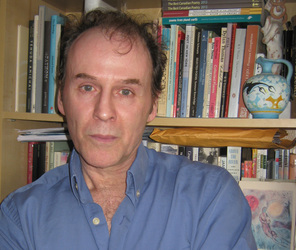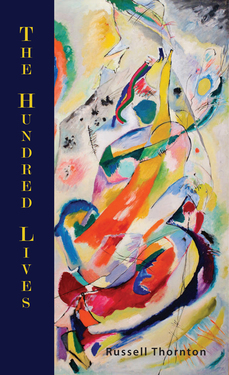RUSTY TALK WITH RUSSELL THORNTON Russell Thornton Russell Thornton RUSSELL THORNTON'S most recent book, The Hundred Lives (Quattro, 2014), was shortlisted for the 2015 Griffin Poetry Prize. His Birds, Metals, Stones & Rain (Harbour, 2013) was shortlisted for the Governor General’s Award for Poetry, the Raymond Souster Award, and the Dorothy Livesay BC Book Prize. His previous books are The Fifth Window (Thistledown, 2000), A Tunisian Notebook (Seraphim, 2002), House Built of Rain (Harbour, 2003), shortlisted for the Dorothy Livesay BC Book Prize and the ReLit Award, and The Human Shore (Harbour, 2006). Thornton’s poems have appeared widely in Canadian literary journals and anthologies, among them The Best Canadian Poetry in English 2012, Open Wide a Wilderness: Canadian Nature Poems, and Rocksalt: An Anthology of Contemporary BC Poetry. Catherine Graham: Congratulations on your Griffin Canadian Poetry nomination for your collection, The Hundred Lives (Quattro Books). Was there a moment when you realized you were a poet or was it something that just built up over time? Russell Thornton: I don’t think much about being a poet, to be honest. I do think a fair bit about writing poems. I’ve always scribbled poems—since I was around 9 or 10 anyway. Before that I often made up rhymes and poems and kept them in my head. I started saving poems I’d written when I was 19-20. I guess that very late teenaged period was a threshold in a long build-up. From my early twenties on, I knew that I wanted to try to write a decent poem. In fits and starts and with many detours, producing poems has been important to me since that time. CG: The first section of The Hundred Lives, "With a Greek Pen," takes us to Greece. Did you go there specifically to write? Tell us about your relationship with place. RT: I went to Greece because I interviewed in Vancouver for a job in Greece and got the job. I’ve never gone anywhere other than a kitchen table or a corner of an apartment to write—except for the last few years when I’ve sat in the local public library for an hour or so a day five days a week (if I’m lucky). Banff, Sage Hill, Spain, Scotland, Iceland, Vermont—I wish! Who knows? Maybe one day. I’m aware that to say that place in the traditional sense is important in poetry is more than a little out of literary fashion at the moment. Our “place” is social media, electronic culture, and the global urban reality. I’m not averse to what the new “place” might help produce in poetry—but place in an older sense is more significant to me. Do you know that wonderful poem by Wallace Stevens, "Anecdote of Men by the Thousand"? A couple of the stanzas have always hit me as being very true:
I find that I’m deeply affected by place—mostly, of course, by the place where I was born and now live. It’s possible that I wouldn’t have started to write poetry if I hadn't come from this place. Not because I opened my eyes in my garret room and saw a sign saying “The Poet’s Café”—but because I saw forest-clothed mountainsides, sky filled with rain like moving windows, an ocean water strait illuminated in the distance, river-mist, the air lighting up, the trees and grass lighting up, as if for the first time after rain; heard rain sounds, creek sounds, ships’ foghorns out on an inlet, seagull and crow cries, rail cars shunting. I spent a lot of time as a small boy preoccupied with following North Vancouver creek-ways (many of which are now gone, in pipes underground). I would start at the mouths of the creeks down near the inlet, and go wherever they led me up though bush, tumbling backyards, parks, and even through a tunnel under the Trans-Canada highway. When I try to trace my feelings, thoughts, imaginings, often I end up tracing aspects of this particular place. It seems inevitable. But of course Greece affected and continues to affect me. I lived in Larissa and Thessaloniki for a few years—coming back to Vancouver a couple of times to drive taxi for a while. I’ve returned to Greece several times over the past decade. I’m struck again and again by the power of the place—that hypnotic white light, that eerie ubiquitous rock, that sea. In terms of the people and culture of the place, there is that deeply wild music, and there is that set of gestures; that excitation and sense of vastness coming always into strict specificity and form. I might have based myself permanently in Thessaloniki or Athens if the person I met in Larissa and became engaged to hadn’t died a very early death from cancer. In the section of poems in this book of mine that you mention, “With a Greek Pen”, she is the person other than me in many of the poems. CG: The poems in the second section, "Lazarus’ Songs to Mary Magdalene,” are responses to the Gospel story of Lazarus and are sonnet-like in shape. Is there more to tell us about your use of the sonnet or form in general? RT: I’ve always loved form in poems. After all, most of the great poems of the English language employ significant aspects of form! Shakespeare’s sonnets are the obvious example. When I first began getting poems in magazines, I knew my poems looked a little more formal than most of the things I saw around, especially in west coast publications. I was using quatrains, counting syllables, and so on. Around the same time, of course, “formalism” was beginning to display force in Canada. But I’ve never been interested in form for form’s sake, or for trying to show off, or for trying to gain false authority. A lot of contemporary formal poetry reminds me of paint-by-number artwork. It’s unnatural, laboured, and empty. I’ve always been attracted to authentic heightened natural speech. I think adept use of form can help with that—but certainly not always. At the very least, poetic form can serve as somewhere to hang one’s hat, so to speak. It can aid in the control that is a basic principle in poetry. In my own case, I’ve been profoundly affected by my discovering that emotion can usher me into form without my initially dictating that form. It’s a humbling experience. Do you know that incredible poem by Emily Dickinson? The first line is “After great pain, a formal feeling comes—”. The emotion is foremost. There’s that Ezra Pound pronouncement: “Only emotion endures.” If you happen to start with form, and emotion, thought, and imaginative energy don’t take over pretty quickly, form is nothing. As for these particular sonnets of mine, my hope is that the sonnet form helped me with the control of emotion and the dramatic organization. These pieces are meant to be “little love songs” in the traditional sense of the sonnet. But they’re only very loose or rough sonnets. They’re fourteen lines long, the lines are usually ten syllables long, and they have “turns”—but that’s it. No rhyme scheme. No formula for stresses within the lines. And so on. The loose form flowed naturally out of the material of the poems. CG: What was it like for you reading at Koerner Hall the night of the Griffin shortlist readings? RT: Well, I didn’t piss my pants. And I didn’t forget my name or how to speak English. It was an exciting literary ride, let me tell you. Do you know of a talk that Sharon Olds gave once about a big award experience? It’s on some video that I once took out of the Vancouver Public Library. She says that she felt as if she was standing at a stage on the audience side, on tiptoe, holding herself at the edge of the stage with her fingers and looking across the stage, her eyes just high enough to see the shoes of the poets who were about to read their poems. That’s how I felt reading at Koerner Hall. I had to keep reminding myself that I was actually one of the readers. My best little memory is this, in two parts: Michael Longley and I sat together for a few moments in the Koerner Hall “green room”. He saw me gobbling my Halls. “Are those sweets?” he asked me. “Could I have one?” He mumbled something about “sugar level”. I gave him a couple of Halls. Later, at the after-reading gathering, I found him in a lull. I told him that I carried several of his poems permanently in my head, just wanted to tell him, and how nice it was to meet him. I said the first line of his poem “Swans Mating”. I think maybe I was going to say the whole poem. Anyhow, he took it from there and quietly and lyrically recited the whole poem by heart to me. On the spot, in a little humble, holy space in the midst of the noise. CG: Who were some of your early influences? RT: My very earliest influence was my maternal grandmother—who published hundreds of stories under various pseudonyms in what were once called “women’s magazines”; she was a talented storyteller. She was actually more truly a writer of poems, though little published except in newspapers when she was a teenager (there were few opportunities for magazine or book publication in her day; she wouldn’t have known about them anyway). She had a gift for metaphor and a wonderful ear. My other early influence was Irving Layton. I met him in Montreal when I was 19, took a course with him, and in the years after that we became friends. Like a lot of people, I came under his spell. His personality and the power of his poetry held me. I continue to be swayed by his several masterpieces—the rhythms, the verbal texture and colour, the full, radiant passion in the utterance. CG: What is the best piece of writing advice you’ve been given that you use? RT: "A great poem is a noble work, and no one ever wrote one who didn't want to get out of hell."—Irving Layton CG: What advice would you give to an aspiring poet? RT: Read, read, read. Write, write, write. It’s the advice I give to myself. CG: What’s next for Russell Thornton? RT: For the past year or two I’ve been working on a manuscript that I’m tentatively calling The Terrible Appearances. What’s next is stealing daily time to try to transform my scribblings into finished pieces. RUSSELL THORNTON'S MOST RECENT BOOK |
Rusty Talk
Rusty Talk Editor: Archives
November 2017
Categories
All
|


 RSS Feed
RSS Feed
